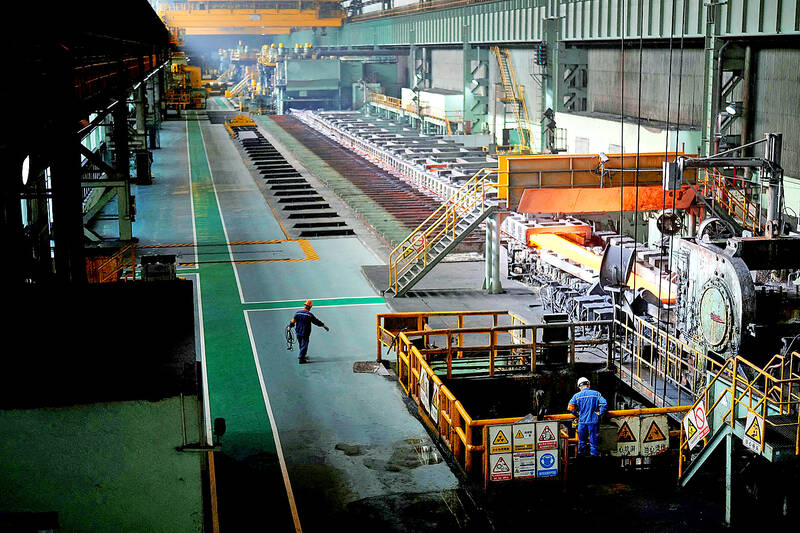China’s steel crisis is setting the stage for a wave of bankruptcies and speeding a much-needed consolidation of the industry, Bloomberg Intelligence (BI) said.
Almost three-quarters of the country’s steelmakers suffered losses in the first half of this year and bankruptcy is likely for many of them, Bloomberg Intelligence senior analyst Michelle Leung (梁穎璋) said in a note.
Xinjiang Ba Yi Iron & Steel Co (新疆八一鋼鐵), Gansu Jiu Steel Group (甘肅酒鋼集團) and Anyang Iron & Steel Group Co (安陽鋼鐵集團) face the highest risk and could be potential acquisition targets, she said.

Photo: Aly Song, Reuters
The wave of consolidation would help Beijing encourage more concentration in its steel industry, Bloomberg Intelligence said.
The government wants the top five companies to control 40 percent of the market by next year and the top 10 to account for 60 percent.
These targets look “achievable,” although China would still be well behind South Korea and Japan in this respect, Leung said.
China’s persistent property crisis and flagging economic growth are reshaping the country’s massive steel industry, with the head of its biggest producer, China Baowu Steel Group Corp (中國寶武鋼鐵集團), warning last month of a crisis worse than in 2008 and 2015.
A slump in domestic demand has meant mills have increased exports, spurring a trade backlash from countries who say the metal is being dumped at below cost.
However, China’s steel exports are not likely to decline until the end of 2026, as total production falls and more trading partners step up restrictions, Bloomberg Intelligence said.
China’s housing rescue package offers the best path for putting the country’s economy on track to expand about 5 percent, in the view of most economists, assuming it is deployed to maximum effect in the face of a real-estate crisis expected to last as long as five more years.
China’s banks might carry out a new round of mortgage rate cuts this year to help shore up flagging consumption, the Securities Daily reported, citing analysts.

In Italy’s storied gold-making hubs, jewelers are reworking their designs to trim gold content as they race to blunt the effect of record prices and appeal to shoppers watching their budgets. Gold prices hit a record high on Thursday, surging near US$5,600 an ounce, more than double a year ago as geopolitical concerns and jitters over trade pushed investors toward the safe-haven asset. The rally is putting undue pressure on small artisans as they face mounting demands from customers, including international brands, to produce cheaper items, from signature pieces to wedding rings, according to interviews with four independent jewelers in Italy’s main

Japanese Prime Minister Sanae Takaichi has talked up the benefits of a weaker yen in a campaign speech, adopting a tone at odds with her finance ministry, which has refused to rule out any options to counter excessive foreign exchange volatility. Takaichi later softened her stance, saying she did not have a preference for the yen’s direction. “People say the weak yen is bad right now, but for export industries, it’s a major opportunity,” Takaichi said on Saturday at a rally for Liberal Democratic Party candidate Daishiro Yamagiwa in Kanagawa Prefecture ahead of a snap election on Sunday. “Whether it’s selling food or

CONCERNS: Tech companies investing in AI businesses that purchase their products have raised questions among investors that they are artificially propping up demand Nvidia Corp chief executive officer Jensen Huang (黃仁勳) on Saturday said that the company would be participating in OpenAI’s latest funding round, describing it as potentially “the largest investment we’ve ever made.” “We will invest a great deal of money,” Huang told reporters while visiting Taipei. “I believe in OpenAI. The work that they do is incredible. They’re one of the most consequential companies of our time.” Huang did not say exactly how much Nvidia might contribute, but described the investment as “huge.” “Let Sam announce how much he’s going to raise — it’s for him to decide,” Huang said, referring to OpenAI

The global server market is expected to grow 12.8 percent annually this year, with artificial intelligence (AI) servers projected to account for 16.5 percent, driven by continued investment in AI infrastructure by major cloud service providers (CSPs), market researcher TrendForce Corp (集邦科技) said yesterday. Global AI server shipments this year are expected to increase 28 percent year-on-year to more than 2.7 million units, driven by sustained demand from CSPs and government sovereign cloud projects, TrendForce analyst Frank Kung (龔明德) told the Taipei Times. Demand for GPU-based AI servers, including Nvidia Corp’s GB and Vera Rubin rack systems, is expected to remain high,